|
[ Home ] [ Current ] [ Archive ]
Školska 2025/26. / Academic year 2025/26 21/01/2026 Obeležavanje Svetskog dana logike 2026 Ilijas Farah (York Univeristy, Toronto, Canada): Conjugacy of trivial autohomeomorphisms of $\beta N\setminus N$ An autohomeomorphism of the Čech-Stone remainder $\beta N\setminus N$ is called trivial if it has a continuous extension to a map from $\beta N$ into itself. Such map is determined by a bijection between cofinite subsets of $N$, so-called almost permutation. By results of W.Rudin and S.Shelah, the question whether nontrivial autohomeomorphisms exist is independent from ZFC. We will be considering rotary autohomeomorphisms, the ones that correspond to permutations of $N$ all of whose cycles are finite. If all autohomeomorphisms are trivial, then the problem of their conjugacy is also trivial (in the usual sense of the word). If the Continuum Hypothesis holds, then in the rotary case this question has a model-theoretic reformulation. While our results are regrettably incomplete, they suffice to decide whether for example the rotary autohomeomorphisms whose cycles have lengths $2^{2n}$, for $n\in N$, and $2^{2n+1}$, for $n\in N$, are conjugate. This is a joint work with Will Brian. 04/12/2025 Dani matematike u Novom Sadu 2025 Igor Dolinka: Canone Inverso Petar Marković: Velika prevara - O najtežem problemu koji se rešava u polinomnom vremenu |
